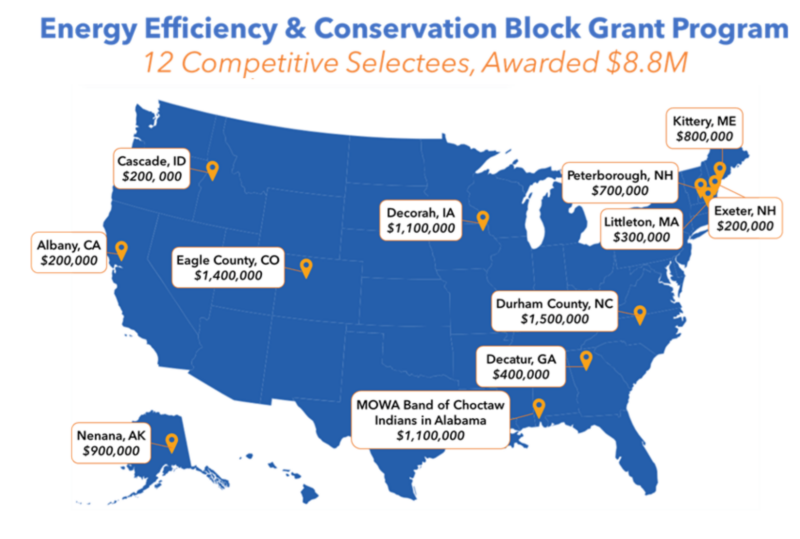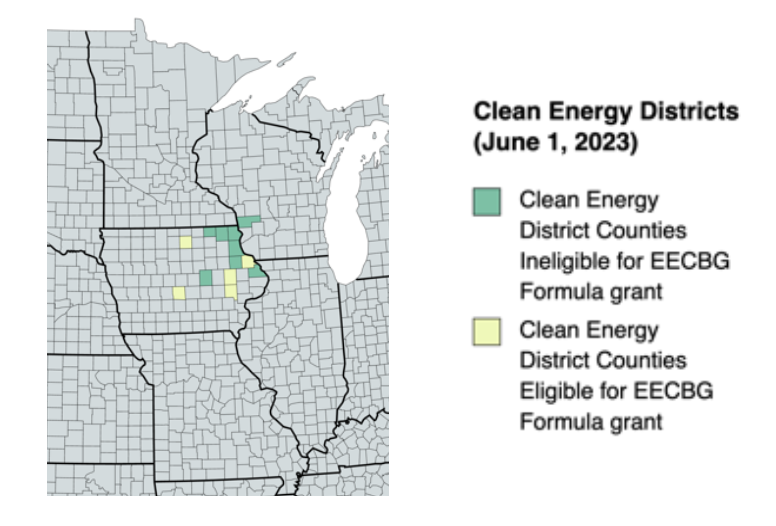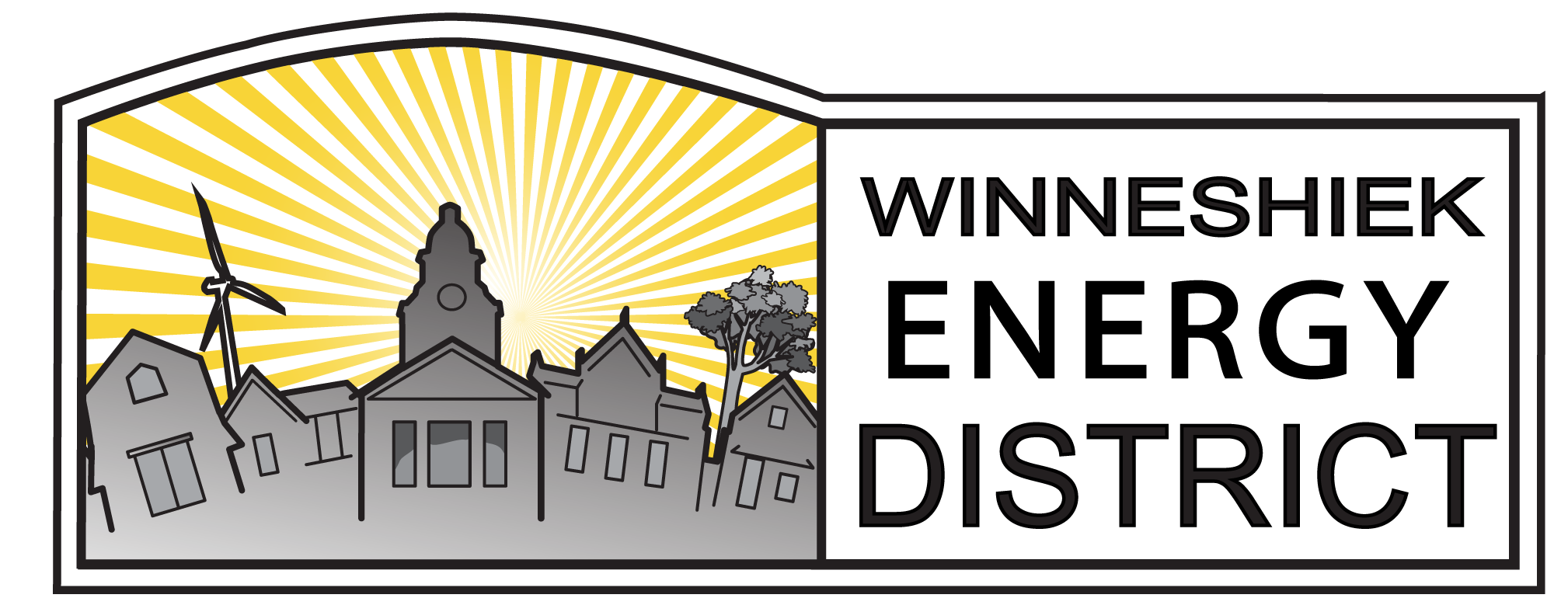The City of Decorah’s Partnership with CEDI Receives a Major Federal Grant
By Jim Martin-Schramm, Policy Analyst, Clean Energy Districts of Iowa
On October 12, 2023, the Department of Energy announced that the City of Decorah, in partnership with the Clean Energy Districts of Iowa, has been awarded $1.1 million in funding from the Energy Efficiency and Conservation Block Grant (EECBG) Competitive Program.
The EECBG Program is designed to assist states, local governments, and Tribes in implementing strategies to reduce energy use, to reduce fossil fuel emissions, and to improve energy efficiency.
There are three facets to the EECBG program. Cities and counties with populations over 50,000 receive automatic allocations via a Formula Grant program. Cities and counties with populations under 50,000 can apply for EECBG funding through their State Energy Office. In addition, there is a national Competitive Program for EECBG funding.
The City of Decorah was one of only twelve communities around the nation that were chosen to receive funding from this national funding opportunity.

As the Prime Applicant, the City of Decorah will work in close partnership with the Clean Energy Districts of Iowa (CEDI), which will manage the project and provide technical assistance to help local governments and school districts benefit from the clean energy transition and to reduce energy burdens in low-income households in several counties in Northeast Iowa and Southwest Wisconsin.
The project area features eight rural counties with clean energy districts where neither the county nor the incorporated cities are eligible for EECBG formula grants. The list includes Vernon County in Wisconsin, which includes Ho-Chunk Nation land, and seven counties in Iowa: Allamakee, Winneshiek, Howard, Clayton, Delaware, Jackson, and Tama County, which includes land owned by the Meskwaki Tribe. The relevant counties are highlighted in green on the map below:

EECBG funding will be used to hire two energy planners and an engineer to provide vital technical assistance to municipalities, school districts, and low-income households throughout the project area so that they can make cost-effective investments in energy efficiency and renewable energy.
In August 2023, CEDI surveyed 228 mayors, city clerks, city managers, school district superintendents, and other key leaders in the eight-county project area. The responses revealed that 95% are interested in receiving assistance via the EECBG funding.
Due to the recent passage of the Building and Infrastructure Law (BIL) and the Inflation Reduction Act (IRA), there is currently an unprecedented amount of funding available at the federal and state levels for investments in renewable energy and energy efficiency. Unfortunately, few people know how to access these funds and how best to utilize them.
EECBG funding will be used to identify cost-effective investments in energy efficiency and renewable energy and to help project participants identify and utilize various financial resources to make these investments. These resources include:
- Federal tax credits, including the use of the elective payment option for non-profits, as well as relevant bonus “adders” for solar projects in low-income, tribal, and/or energy communities.
- Third-party power purchase agreements, which tap the federal tax credits but also utilize other tax benefits available to for-profit entities such as accelerated depreciation. Municipal governments and other non-taxable entities that sign these agreements no longer have to address the financing obstacle and typically enjoy substantial energy cost savings. These agreements are legal in Iowa but not yet in Wisconsin. Several municipal governments, school districts, and other non-taxable entities have already utilized this option–mostly in and near Winneshiek County (IA).
- Rebates provided by the Home Energy Performance-Based, Whole-House Rebates (HOMES) program and the High-Efficiency Electric Home Rebate (HEEHR) program administered by the State Energy Offices in Iowa and Wisconsin.
- USDA programs such as the Rural Energy for America Program Energy Audit & Renewable Energy Development Assistance Grants as well as the Rural Energy for America Program Renewable Energy Systems & Energy Efficiency Improvement Guaranteed Loans & Grants.
- Services and equipment incentives provided by the energy efficiency programs offered by area utilities.
- Additional financial resources that may be available through regional housing trust funds and community foundations.
The City of Decorah and CEDI are currently in a 60-day grant award negotiation period with the EECBG Program since the original grant proposed using $1.56 million in EECBG funding over three years but the program could only provide $1.1 million. As a result, it is likely that the funding will be spread over 28 months rather than 36 months. We expect the program to commence in January 2024.
CEDI will soon provide more information about how communities in Iowa can apply for EECBG funding from Iowa’s State Energy Office.
This is the second major award to the City of Decorah by the EECBG program. In 2010, the program provided the city with $880,000–over half of which was used by the Winneshiek Energy District to provide energy planning services to the residents of Winneshiek County and to develop the replicability of the energy district model.
Today there are twelve legally incorporated energy districts located in Allamakee, Cerro Gordo, Clayton, Delaware, Dubuque, Howard, Jackson, Johnson, Linn, Muscatine, Polk, and Winneshiek County. Additional counties are in the planning stages.
Contact CEDI’s Policy Analyst, Jim Martin-Schramm, for more information.
